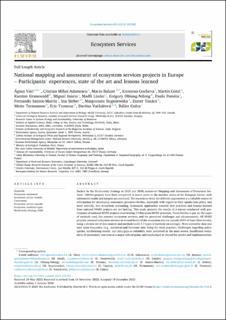National mapping and assessment of ecosystem services projects in Europe – Participants’ experiences, state of the art and lessons learned
Vári, Ágnes; Adamescu, Cristian Mihai; Balzan, Mario; Gocheva, Kremena; Götzl, Martin; Grunewald, Karsten; Inácio, Miguel; Linder, Madli; Obiang-Ndong, Gregory; Pereira, Paulo; Santos-Martín, Fernando; Sieber, Ina; Stepniewska, Malgorzata; Tanacs, Eszter; Termansen, Mette; Tromeur, Eric; Vackarova, Davina; Czúcz, Bálint
Peer reviewed, Journal article
Published version

Åpne
Permanent lenke
https://hdl.handle.net/11250/3110625Utgivelsesdato
2024Metadata
Vis full innførselSamlinger
- Publikasjoner fra CRIStin - NINA [2364]
- Scientific publications [1392]
Originalversjon
10.1016/j.ecoser.2023.101592Sammendrag
Backed by the Biodiversity Strategy to 2020 and 2030, numerous ‘Mapping and Assessment of Ecosystem Services’ (MAES) projects have been completed in recent years in the member states of the European Union, with substantial results and insights accumulated. The experience from the different approaches is a valuable source of information for developing assessment processes further, especially with regard to their uptake into policy and more recently, into ecosystem accounting. Systematic approaches towards best practices and lessons learned from national MAES projects are yet lacking. This study presents the results of a survey conducted with participants of national MAES projects overviewing 13 European MAES processes. Focus hereby is put on the types of methods used, the assessed ecosystem services, and the perceived challenges and advancements. All MAES projects assessed ecosystem services at several levels of the ecosystem service cascade (69% at least three levels), using a diverse set of data sources and methods (with 4.7 types of methods on average). More accessible data was used more frequently (e.g., statistical and literature data being the most popular). Challenges regarding policy uptake, synthesizing results, and data gaps or reliability were perceived as the most severe. Insufficient evaluation of uncertainty was seen as a major critical point, and emphasized as crucial for uptake and implementation. Moving towards accounting for ES in the frame of environmental-economic accounts, considering uncertainties of ES assessments should be even more important. Ecosystem assessment Ecosystem service models Uncertainty Ecosystem service cascade Ecosystem condition types Biodiversity Strategy 2020
Tidsskrift
Ecosystem ServicesOpphavsrett
© 2023 The AuthorsBeslektede innførsler
Viser innførsler beslektet ved tittel, forfatter og emneord.
-
Carbon storage in Norwegian ecosystems (revised edition)
Bartlett, Jesamine; Rusch, Graciela M.; Kyrkjeeide, Magni Olsen; Sandvik, Hanno; Nordén, Jenni (NINA Report;1774b, Research report, 2020)Bartlett, J., Rusch, G.M., Kyrkjeeide, M.O., Sandvik, H. & Nordén, J. 2020. Carbon storage in Norwegian ecosystems (revised edition). NINA Report 1774b. Norwegian Institute for Nature Research. This report discusses ... -
Karbonlagring i norske økosystemer (revidert utgave)
Kyrkjeeide, Magni Olsen; Bartlett, Jesamine; Rusch, Graciela M.; Sandvik, Hanno; Nordén, Jenni (NINA Temahefte;76b, Book, 2020) -
Nye virkemidler i arealforvaltningen – naturrestaurering, arealregnskap og naturavgift
Hagen, Dagmar; Skrindo, Astrid B.; Evju, Marianne; Nybø, Signe; Simensen, Trond; Kolstad, Anders L. (NINA Rapport;2097, Research report, 2022)Hagen, D., Skrindo, A.B., Evju, M., Nybø, S., Simensen, T. & Kolstad, A.L. 2022. Nye virkemidler i arealforvaltningen – naturrestaurering, arealregnskap og naturavgift. NINA Rapport 2097. Norsk institutt for naturforskni ...
